Meeting link: https://www.youtube.com/@KSASTALK
Date: (01-01-0101), TIME: N/A
– ID: , Passcode:
N/A
Live on: YouTube : @KSASTALK
KSAS Philosophy Cafe
Visit https://www.youtube.com/@KSASTALK to view past KSAS Philosophy Cafe episodes and check out our upcoming events!
Meeting link: https://us06web.zoom.us/j/82646904741?pwd=wdZv8xbAmnFoEIN6Szbvhh45Jy4j7t.1
Date: (02-02-2026), TIME: 4 PM (IST) / 5:30 am (EST)
Philosophy Cafe - Season 4 Episode 1 – ID: 826 4690 4741, Passcode:
130612
Live on: YouTube : @KSASTALK
SPEAKER’S PROFILE
Dr. Ashok Kumar Satapathy is an Associate Professor in the Department of Sanskrit and Prakrit Languages at the University of Lucknow, specializing in Sanskrit Literature, Kavyashastra, and Indian Aesthetics. He completed a UGC-funded project, supervised multiple Ph.D. and M.Phil. scholars, published extensively, and presented at national and international seminars. He has also served in key academic and administrative roles and is proficient in five languages.
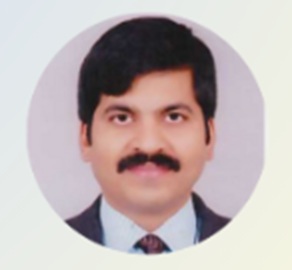
ABSTRACT
Sanskrit Kavya and Kavyashastra are deeply rooted in Indian philosophical thought, where aesthetics serves as a pathway to higher knowledge. Theories such as Rasa, Dhvani, Alankara, and Vakrokti reflect metaphysical, epistemological, and ethical concerns of Indian philosophy. Poetic experience is not merely artistic pleasure but a means of inner refinement and self-realization, uniting beauty (saundarya), truth (satya), and consciousness (chaitanya) in literary expression.
Kuruom School of Advanced Sciences, Lucknow, India & Institute of Advanced Sciences (INADS), Dartmouth, MA, USA
Meeting link: https://us06web.zoom.us/j/6977021728?pwd=NIZWQ1p5d3BXQTdKWDhHUC95L3UxZz09&omn=87366245069
Date: (20-11-2025), TIME: 2:30 pm - 6:45 pm (IST)
One-Day International Symposium – ID: 697 702 1728, Passcode:
130612
Live on: YouTube : @KSASTALK
Attendees
Resource Persons:
- Professor Namita Nimbalakar, Professor, University of Mumbai
- Dr. Prashant Skukla, Associate Professor, University of Lucknow
- Dr. Priyanka Mishra, Assistant Professor, Banaras Hindu University
Panel Discussion on "Anxiety Management Through Holistic Approach"
Panelists:
- Dr. Sangeeta Sharma, Ayurveda Vaidya Maharishi International University, Iowa, USA
- Ms. Aparna Sharma, Founder of Anantham Mind Studio, New Delhi
- Dr. Racheal Nikita Sharma, Assistant Professor, MIT World Peace University, Pune
Chief Patron & Session Chair:
- Dr. Bal Ram Singh, President, Institute of Advanced Sciences (INADS), MA, USA
- Dr. Shipra Dikshit, Assistant Professor, KSAS, INADS
Coordinators:
- Dr. Raj Kumar, Director, KSAS, INADS
- Dr. Shipra Dikshit, Assistant Professor, KSAS, INADS
- Dr. Alok Dwivedi, Assistant Professor, KSAS, INADS
Technical Assistance:
- Ms. Preeti Kaushik, KSAS
- Mr. Avinash Tiwari, KSAS
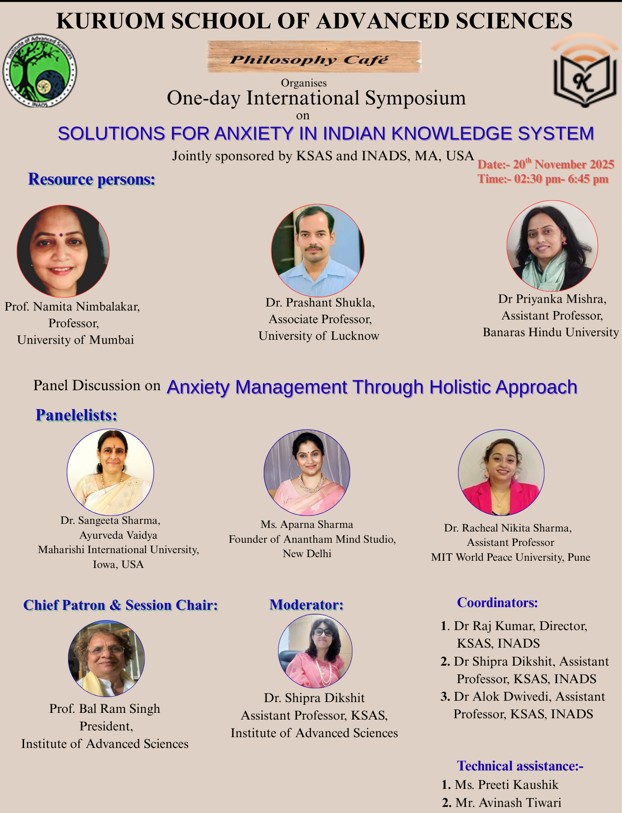
Program Details
Program Schedule (IST - Indian Standard Time)
2:30 pm - 2:40 pm
- Introduction of Philosophy Cafe and Abhivadan by Dr. Shipra Dikshit
2:40 pm - 2:55 pm
- Speech on IKS and goals of KSAS by Dr. Alok Dwivedi
3:00 pm - 3:35 pm
- Talk 1 by Professor Namita Nimbalakar, University of Mumbai
3:40 pm - 4:15 pm
- Talk 2 by Dr. Prashant Shukla, University of Lucknow
4:15 pm - 4:45 pm
- Discussion
4:45 pm - 4:55 pm
- Break
4:55 pm - 5:30 pm
- Talk 3 by Dr. Priyanka Mishra
5:30 pm - 5:45 pm
- Panel Discussion: Anxiety Management through a Holistic Approach (chaired by Dr. Bal Ram Singh, President, INADS, USA)
6:20 pm - 6:35 pm
- Feedback and outcomes discussed by Dr. Raj Kumar, Director, KSAS, Lucknow
6:35 pm - 6:45 pm
- Closing by Dr. Alok Dwivedi and Dr. Shipra Dikshit
Philosophy Cafe at Kuruom School of Advanced Sciences, Lucknow, India & Institute of Advanced Sciences (INADS), Dartmouth, MA, USA
Meeting link: https://us06web.zoom.us/j/87092720454?pwd=jnLbxe1EnhYbLoNOASozXam3hNy7tn.1
Date: (23-09-2025), TIME: 6 PM (IST)
Philosophy Cafe - Season 3 Episode 8 – ID: 870 9272 0454, Passcode:
130612
Live on: YouTube : @KSASTALK
SPEAKER’S PROFILE
Dr. Pallabi Mukherjee currently works as an Assistant Professor in the Department of Buddhist Studies at Swami Vivekanand Subharti University in Meerut, Uttar Pradesh, India. She holds a Ph.D. in Applied Buddhism - Reiki and Philosophy of Alternative Modern Healing System in Tibet from the Department of Philosophy at Nava Nalanda Mahavihara in Nalanda, Bihar, India. Her research explores the intersections of Buddhist Psychology, Consciousness Studies, and indigenous healing practices, with a particular focus on Reiki and energy-based therapies as forms of Applied Buddhism.

ABSTRACT
The doctrine of Sunyavada, central to Nagarjuna's Madhyamaka philosophy, emphasizes the emptiness of inherent existence and reveals the interdependent nature of reality. While often studied as a profound metaphysical insight, its applied dimension holds significant relevance for contemporary wellbeing. By dissolving rigid notions of self and other, Sunyavada fosters inner peace, reduces conflict, and nurtures psychological resilience. In the context of mental health, this philosophy provides a framework for transcending ego-based suffering, anxiety, and attachment. Applied Buddhist practices such as meditation, mindfulness, and energy-based healing methods draw upon the insight of emptiness to cultivate balance and harmony in daily life. Contemporary approaches, including Buddhist-inspired Reiki meditation, demonstrate how Sunyavada can be integrated into holistic healing for stress reduction and emotional well-being. Thus, the philosophy of emptiness emerges not only as a path to liberation but also as a practical resource for peace and mental health today.
Kuruom School of Advanced Sciences, Lucknow, India & Institute of Advanced Sciences (INADS), Dartmouth, MA, USA
Meeting link: https://us06web.zoom.us/j/82514994904?pwd=pLHN9a2YhTtCtf45nMY7CT014VCaD8.1
Date: (21-08-2025), TIME: 5 PM (IST)
Philosophy Cafe - Season 3 Episode 7 – ID: 825 1499 4904, Passcode:
130612
Live on: YouTube : @KSASTALK
SPEAKER’S PROFILE
Professor Hari Narayanan V is a Professor in the School of Liberal Arts at the Indian Institute of Technology (IIT) in Jodhpur. He earned his PhD from IIT Kanpur in 2009 and subsequently taught for two years at Shri Mata Vaishno Devi University. Since joining IIT Jodhpur in 2011, he has been engaged in teaching and research. His current research interests focus on embodied cognition, the nature of the self, and Indian intellectual traditions. He has published works in several national and international journals, including Mind and Society, AI and Society, Balkan Journal of Philosophy, South African Journal of Philosophy, and the Journal of the Indian Council of Philosophical Research.
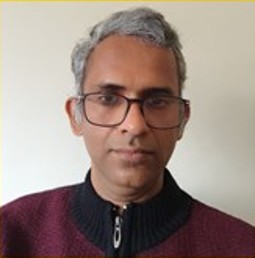
ABSTRACT
In this talk, Professor Hari Narayanan V shall argue that the long-standing discussions concerning the inclusion of moksa within the set of purusarthas can be enriched by considering the possibility of fundamental transformations in mentality. The various reasons often advanced for including moksa become more intelligible when we take into account the likelihood that the conception of the self as an inner entity became firmly entrenched over time due to a confluence of factors. In conclusion, he will address certain criticisms that claim that moksa does not harmonize well with the other purusarthas.
Kuruom School of Advanced Sciences, Lucknow, India & Institute of Advanced Sciences (INADS), Dartmouth, MA, USA
Meeting link: https://us06web.zoom.us/j/85275833239?pwd=IcOVVitKCxKpDQ17R6GSjJuKcFZBzs.1
Date: (29-07-2025), TIME: 6:30 pm (IST)
Philosophy Cafe - Season 3 Episode 6 – ID: 852 7583 3239, Passcode:
130612
Live on: YouTube : @KSASTALK
SPEAKER’S PROFILE
Mr. Swastik Banerjee is currently pursuing his doctoral research in Philosophy at the University of Calcutta. His thesis, "The Problem of Self in the Anuttara Trika Philosophy of Kashmir with Special Reference to Ksemaraja: An Exegetical and Critical Study," explores the non-dualistic ontology of the Trika tradition through a philosophical lens. He is a recipient of the University Research Fellowship and the Ishwar Ashram Trust Fellowship, and holds a first rank in M.A. Philosophy from the University of Madras.
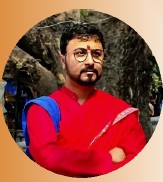
ABSTRACT
The notion of bhakti (devotion) within Tantric traditions presents an apparent philosophical contradiction. Bhakti presupposes a dualistic relationship between the bhakta (devotee) and the devata (deity), seemingly at odds with the non-dual metaphysics central to Kaula and Trika Tantra, where the realization of the Self as the only ultimate reality (citi) is the stated goal. This raises a key question: How can bhakti, which is grounded in otherness, be reconciled with a system that asserts the fundamental unity of Self and God?
A second, equally complex issue arises from the non-dual perspective itself. If the Self and the divine are always already identical, what necessity remains for any form of ritual practice, worship, or devotion? From this standpoint, such practices risk appearing redundant or even illusory. Despite these tensions, Kaula and Trika traditions maintain a robust ritual culture infused with devotion, while simultaneously upholding the doctrine of non-duality. This coexistence suggests that bhakti and ritual are not merely provisional tools, but integral to the realization and expression of non-dual awareness.
Banerjee's paper examines the apparent paradox by employing the philosophical framework of Pratyabhijna (Recognition) from Kashmir Shaivism to interpret the ritual and devotional dimension of the Kaula tradition. The aim is to demonstrate that bhakti in this context is not an obstacle to non-duality, but a means through which the divine recognized itself in the play of Self and Other.
Kuruom School of Advanced Sciences, Lucknow, India & Institute of Advanced Sciences (INADS), Dartmouth, MA, USA
Meeting link: https://us06web.zoom.us/j/85299391704?pwd=RzOV7knNlaCUSqMNDJ2nEwKDhJlCbr.1
Date: (21-06-2025), TIME: 6 PM (IST)
Philosophy Cafe - Season 3 Episode 5 – ID: 852 9939 1704, Passcode:
130612
Live on: YouTube : @KSASTALK
SPEAKER’S PROFILE
Dr. Prashant Shukla is an Associate Professor in the Philosophy department at Lucknow University. He is a fellow of the American Philosophy Practitioners Association and actively involved in various academic bodies. He also serves as a visiting faculty member for Symbolic Logic at BITS Pilani. He earned his doctoral degree from Jawaharlal Nehru University (JNU) with research interests in Indian and Western Philosophy.
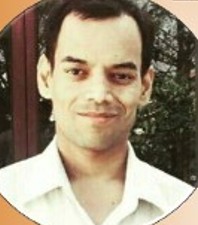
ABSTRACT
He examines the enduring philosophical tension between Idealism and Realism, tracing its foundational importance in Western thought and exploring whether it is ultimately escapable. Beginning with the metaphysical frameworks of Plato and Aristotle, the study highlights how subsequent philosophical traditions have either aligned with or critically responded to these paradigms. The work discusses key developments through rationalism, empiricism, and scientific realism, before turning to the emergence of Pragmatism in the late 19th century as a significant critique of the traditional metaphysical enterprise. Through an analysis of Peirce's, James's, and Dewey's contributions, he argues that pragmatism, while redefining the concepts of truth and knowledge in practical and operational terms, risks moving beyond philosophical boundaries by abandoning the metaphysical and epistemological rigor that historically characterized philosophy. The pragmatic truth undermines universal standards in ethics, epistemology, and scientific inquiry. Furthermore, the existentialist and postmodernist critiques - particularly those of Heidegger, Sartre, Derrida, and Foucault - are examined as more profound philosophical responses to the limitations of both Idealism and Realism, contrasting with Pragmatism's more methodological and functional approach. Dr. Shukla's paper ultimately raises critical concerns about whether Pragmatism, in rejecting traditional metaphysical inquiry, can maintain its claim to be a genuine philosophical system. By situating Pragmatism within the broader history of philosophical thought, he argues that while its methodological insights are valuable for practical disciplines such as science, politics, and education, its theoretical limitations render it insufficient as a comprehensive philosophical worldview. The study concludes by reaffirming the necessity of maintaining philosophical clarity, precision, and metaphysical inquiry to preserve philosophy's distinctive role in the intellectual tradition.
Kuruom School of Advanced Sciences, Lucknow, India & Institute of Advanced Sciences (INADS), Dartmouth, MA, USA
Meeting link: https us06web.zoom.us/j/89857385457?pwd=l8j6U3OaAmIbt3bkiPabFb95crnFXA.1
Date: (21-05-2025), TIME: 6 PM (IST)
Philosophy Cafe - Season 3 Episode 4 – ID: 898 5738 5457, Passcode:
130612
Live on: YouTube : @KSASTALK
SPEAKER’S PROFILE
Professor Balaganapathi Devarakonda was the former head of the Department of Philosophy at the University of Delhi. He received a PhD from the University of Hyderabad. From 2022 through 2024, Dr. Devarakonda was with the University of West Indies, Jamaica, as ICCR Chair for Indology and Gandhian Studies. His research publications include Historiography of Indian Philosophy, Early Buddhism, Bio-Informationalism, and Philosophical Practice in various Scopus-indexed international journals. He was a Chancellor's nominee (2018-2019) for the Board of Management of Mohan Lal Sukhadia University, Udaipur. He was also a member of the Review Committee of the Indian Council of Philosophical Research, constituted by MHRD (2018).
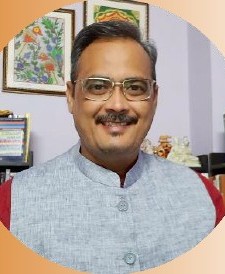
ABSTRACT
In the landscape of modern Indian philosophy, K. Satchidananda Murty (1924-2011) stands out as a thinker who navigated the tension between critical inquiry and cultural rootedness with extraordinary clarity and conviction. This lecture explores Murty's philosophical vision as a sustained response to what he perceived as the core challenge of postcolonial Indian thought: the responsibility to think authentically, not merely in continuity with tradition, but also dialogical engagement with the contemporary world.
Murty's theistic metaphysics, his reflections on Being, Vibbuti, and the Realm Between transcendence and immanence, reveal a metaphysical framework that is both spiritually resonant and intellectually rigorous. His critique of orientalist, missionary, and nationalist misreadings of the "Indian Spirit" underscores his refusal to reduce philosophy to ideology or cultural nostalgia.
This lecture addresses:
- Why Murty's thought remains profoundly relevant for today's young scholars and truth seekers,
- How his work illuminates the trajectory of Indian philosophy across the last hundred years,
- And how his emphasis on philosophical responsibility invites us to rethink the role of the philosopher, as one committed not just to systems and schools, but to truth, self-knowledge, and ethical engagement.
Drawing also from his work, Dr. Devarakonda argues that Murty offers not just a metaphysical vision, but a model of philosophising that is urgently needed in our times: one that is courageous, critical, and morally accountable.
Kuruom School of Advanced Sciences, Lucknow, India & Institute of Advanced Sciences (INADS), Dartmouth, MA, USA
Meeting link: https://us02web.zoom.us/j/87247104279?pwd=SjFMUnXtwxsB5DhQuNTs2VlKTSo6tf.1
Date: (21-04-2025), TIME: 6:30 pm (IST)
Philosophy Cafe - Season 3 Episode 3 – ID: 872 4710 4279, Passcode:
130612
Live on: YouTube : @KSASTALK
SPEAKER’S PROFILE
Professor Rishi Kant Pandey is an eminent Professor and Former Head of the Department of Philosophy, University of Allahabad. He is a gold medalist in Masters, and has earned his D.Phil degree in philosophy from the University of Allahabad. Professor Pandey has over fifty articles to his credit published in the referred philosophy journals. His areas of specialization are: Indian Philosophy, Philosophy of Religion, Epistemology, and Contemporary Western Philosophy.
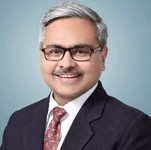
ABSTRACT
Religion, Dharma, and Adhyatma are generally considered synonyms in our daily lives. A close, in-depth study of these terms reveals that they are different from each other. Religion means Semitic religion, Prophetic religion, Abrahamic religion, Institutional religion, or Organized religion, which consists of three main religions: Judaism, Christianity, and Islam. Out of the three, Judaism is the father, and Christianity and Islam are derived from it. The Semitic religion has some specific characteristics, for example, there is a supernatural being, and that being is considered mystical. In addition, the concept of the Prophet, a particular kind of scripture, certain rituals, the feelings of the religious organization, and unconstitutional faith are the central themes of religion. Spirituality means integral purification. It is about rituals and abidance in self, i.e., self-realization. In other words, one can say that spirituality is the knowledge of the self, for the self, and by the self. Dharma is the practical application of spirituality. It is a code of conduct and mode of life.
Kuruom School of Advanced Sciences, Lucknow, India & Institute of Advanced Sciences (INADS), Dartmouth, MA, USA
Meeting link: https:// us02web.zoom.us/j/83781012624?pwd=RvKtyGxPIm1RYcFjUv5jBOHbhXLTTq.1
Date: (21-03-2025), TIME: 6 PM (IST)
Philosophy Cafe - Season 3 Episode 2 – ID: 837 8101 2624, Passcode:
130612
Live on: YouTube : @KSASTALK
SPEAKER’S PROFILE
Dr. Sanjay Kumar Shukla is a Professor and Head of the Philosophy Department at Ewing Christian College (an autonomous constituent PG college of the University of Allahabad). His academic qualifications include a PhD and D. Lit., teaching area and specialization in Modern Western Philosophy, Ethics, Western Logic, and Epistemology. His research area includes the Philosophy of Immanuel Kant, Husserl's Phenomenology, and Contemporary Indian Philosophy.
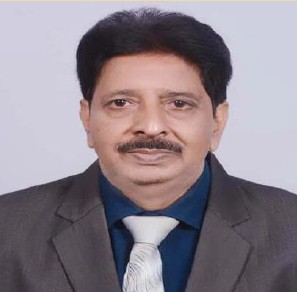
ABSTRACT
Sangam Lal Pandey is well-trained and deeply rooted in the Indian philosophical tradition, but at the same time, he has a perfect understanding of Western Philosophy. He has introduced the concept of depth epistemology in his Problems of Depth Epistemology, which is a collection of four serious essays written by P.S. Kaul, R.D. Ranada, A.C. Mukherjee, and R.N. Kaul. S.L. Pandey has contrasted depth epistemology with surface epistemology. The former is foundational to human experience, whereas the latter is confined to the source of knowledge (Pramana). Depth epistemology is an inquiry into foundational consciousness, a logical resupposition of all objective knowledge. "Self-centric metaphysics is a thrust of it. He considers 'Lakshana-Mimansa to be a fundamental notion as having priority over "Pramana-Mimansa."
Kuruom School of Advanced Sciences, Lucknow, India & Institute of Advanced Sciences (INADS), Dartmouth, MA, USA
Meeting link: https://us02web.zoom.us/j/6977021728?pwd=NlZWQ1p5d3BXQTdKWDhHUC95L3UxZz09&omn=85834619828
Date: (21-01-2025), TIME: 6 PM (IST)
Philosophy Cafe - Season 3 Episode 1 – ID: 697 702 1728, Passcode:
130612
Live on: YouTube : @KSASTALK
SPEAKER’S PROFILE
Dr. Bhanu Pratap is currently working as an Assistant Professor of Law, Faculty of Law, University of Lucknow. He has earned his Ph.D. in Law from the University of Lucknow. He is the author of two books, "An Introduction to the International Court of Justice, Thomson Reuters" and "Textbook on Public International Law, Universal Publication."
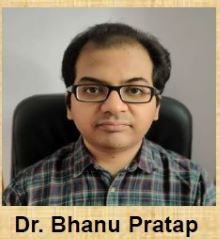
ABSTRACT
The notion of Sovereignty is the conceptual base of the contemporary polity. Despite the forces of globalization and technology, Sovereignty is here to stay for a long time. The discussion does not intend to provide a linear narration of sovereignty but to analyze its structure to expose its inherent imperial characteristics. The present discussion wants to provide an exegetical analysis of sovereignty and frame it as an imperial gift of the West that the Asian, African, and Latin American states have reluctantly accepted. The advent of the East India Company was a cultural shock for Indians as it displaced an entire societal system. The conceptual differences between Smprabhuta and Sovereignty will be analyzed by exploring the ideas of Radha Binod Pal and Bhudev Mukhopadhyay, who were ardent critics of European colonialism. Further, the discussion will analyze Sukumar Sen and Priya Nath Sen, scholars of Hindu Law, who differentiated the Hindu polity from its Judaeo-Christian counterpart. Upinder Singh's views on the segmentary state will be discussed. An understanding of Bharat Mata, an epistemic counter to British imperialism shall be furthered. The less discussed area of the 'acquiescence of the colonized' will make an appearance while exploring the latest work of Swati Srivastava, 'Hybrid Sovereignty'.
Kuruom School of Advanced Sciences, Lucknow, India & Institute of Advanced Sciences (INADS), Dartmouth, MA, USA
Meeting link: https://us02web.zoom.us/j/86133644896?pwd=TauFsSvh16G0bWLhmuVpLGtPazwVyI.1#success
Date: (26-12-2024), TIME: 6:30 pm (IST)
Philosophy Cafe - Season 2 Episode 6 – ID: 861 3364 4896, Passcode:
130612
Live on:
SPEAKER’S PROFILE
Dr. Umesh Kumar Singh is an Independent Vedic scholar
Ar. Rupa Bhaty is an Adjunct Professor at the Institute of Advanced Sciences (INADS), USA
Dr. Shipra Dikshit is an Assistant Professor at KSAS & INADS, USA
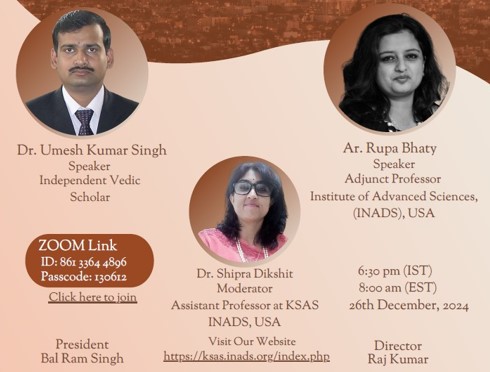
ABSTRACT
The Philosophy Cafe proudly presents the Lecture Series on "Hundred Years of Development of Indian Philosophy." It is jointly sponsored by the Institute of Advanced Sciences (INADS) USA, and KSAS Lucknow, India.
130612
Meeting link: https://us02web.zoom.us/j/85863257564?pwd=waXK3cvrvf7T7aaotbp6t662RrXaFR.1
Date: (16-11-2024), TIME: 10 AM (IST)
KSAS One-Day National Symposium – ID: 858 6325 7564, Passcode:
529433
Live on: N/A
SPEAKER’S PROFILE
Featured Speakers:
Dr. J.S. Dubey, Hamidia College, Bhopal
Dr. Rahul Maurya, Banaras Hindu University, Varanasi
Dr. Bhanu Pratap, Lucknow University, Lucknow
Dr. Jayant Upadhyaya, Wardha University, Wardha
Dr. Malay Jha, Banaras Hindu University, Varanasi
Dr. Ramesh Chander, Jammu University, Jammu
Dr. Prashant Shukla, Lucknow University, Lucknow
Dr. Zairu Nisha, Delhi University, Delhi
Dr. Amit Kumar, Bundelkhand University, Jhansi
Dr. Bal Ram Singh, Institute of Advanced Sciences, USA
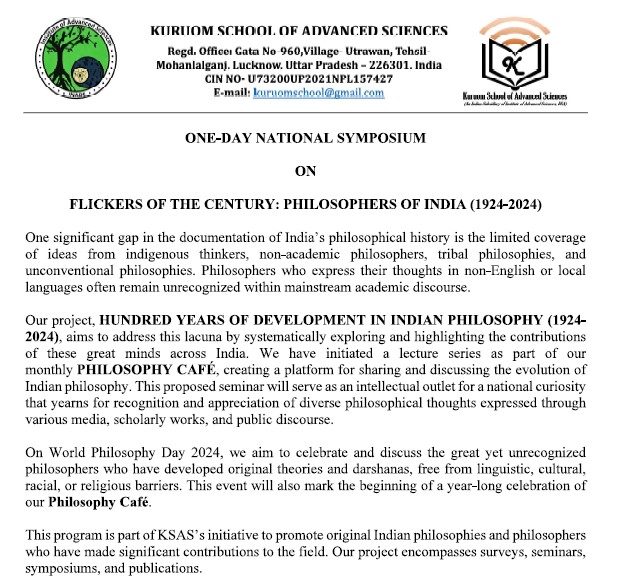
ABSTRACT
One significant gap in the documentation of India’s philosophical history is the limited coverage of ideas from indigenous thinkers, non-academic philosophers, tribal philosophies, and unconventional philosophies. Philosophers who express their thoughts in non-English or local languages often remain unrecognized in mainstream academic discourse.
Our project, "Hundred Years of Development in Indian Philosophy (1924-2024)", aims to address this lacuna by systematically exploring and highlighting the contributions of these great minds across India. We have initiated a lecture series as part of our monthly Philosophy Café Series, creating a platform for sharing and discussing the evolution of Indian philosophy. This proposed seminar will serve as an intellectual outlet for a national curiosity that yearns for recognition and appreciation of diverse philosophical thoughts expressed through various media, scholarly works, and public discourse.
On World Philosophy Day 2024, we aim to celebrate and discuss the great yet unrecognized philosophers who have developed original theories and darshanas, free from linguistic, cultural,
racial, or religious barriers. This event will also mark the beginning of a year-long celebration of Philosophy Café. This program is part of KSAS’s initiative to promote original Indian philosophies and philosophers who have made significant contributions to the field. Our project encompasses surveys, seminars, symposiums, and publications.
The program is jointly organized by KSAS, Lucknow, and the Akhil Bhartiya Darshan Parishad, Bhopal.
Organizing Committee:
• Dr. Shipra Dixit
• Dr. Alok Kumar Dwivedi
• Dr. Shruchi Singh
• Dr. Umesh Kumar Singh
• Dr. Raj Kumar
Dr. Alok Kumar Dwivedi and Dr. Shipra Dixit will moderate the event. The day-long program will include two sessions featuring presentations from renowned scholars, culminating in a panel discussion.
Panel Discussion Topic:
Is Indian Philosophy Exclusive or Non-Exclusive?
Kuruom School of Advanced Sciences, Lucknow, India & Akhil Bhartiya Darshan Parishad, Bhopal
Meeting link: https:// us02web.zoom.us/j/6977021728?pwd=NlZWQ1p5d3BXQTdKWDhHUC95L3UxZz09&omn=84069490493
Date: (16-10-2024), TIME: 6:30 pm (IST)
Philosophy Cafe - Season 2 Episode 4 – ID: 697 702 1728, Passcode:
130612
Live on: YouTube : @KSASTALK
SPEAKER’S PROFILE
Dr. (Ms.) Asha Mukherjee is a retired Professor of Philosophy, former Chair of the Department of Philosophy and Comparative Religion, and Former Dean of the Institute of Humanities and Social Sciences, Visva-Bharati Central University, Santiniketan, West Bengal, India.
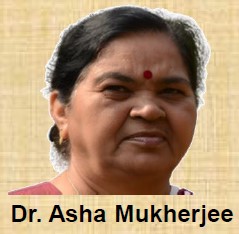
ABSTRACT
Daya Krishna (1924-2007) was one of the most creative, polemic, and prolific thinkers of the 20th century. She worked intensely to undo the stereotypes commonly attributed to Indian philosophy, challenging the views that sought to reduce millennia of intellectual debate to merely religious, practical, and spiritual parameters. A forerunner of global philosophy, Daya Krishna belongs to that generation of twentieth-century Indian thinkers who undermined the foundations of epistemic provincialism through writings that draw on multiple sources of knowledge to think about problems that challenge us in the present, questioning the very nature of philosophy. The year 2024 marks the birth centenary and as her student, I pay my homage to her to celebrate it philosophically.
In this presentation, I will try to explore and understand Daya Krishna's nature of values. I begin by asking questions such as what it means to be moral and how it relates to freedom. What does it mean to be a value? Is transcendence an essential requirement for any value? How moral value is different from other values. For Daya Krishna, valuing is essentially human activity, and it essentially involves various kinds of dynamics and not opposition - man and animal, self and other, is and ought, freedom and determinism, subjective and objective, empirical and ideal, fact and value, active and contemplative, individual and society, rights and responsibilities. Every value requires "transcendence" - a conscious transcendence by choice and not just a fact of transcendence itself. I intend to explore various meanings of "transcendence" hidden in various writings of Daya Krishna, comparing with some other philosophers, specifically Kant, Nicolai Hartmann, and Kalidas Bhattacharya.
It is argued that for Daya Krishna just a fact of transcendence itself cannot be understood as demand and therefore cannot lead to any value.
Kuruom School of Advanced Sciences, Lucknow, India & Institute of Advanced Sciences (INADS), Dartmouth, MA, USA
Meeting link: https://us02web.zoom.us/j/89866282101?pwd=EWdWpyRfi1cblywehYbM8pjN7Xmpj1.1
Date: (16-09-2024), TIME: 4:30 pm (IST)
Philosophy Cafe - Season 2 Episode 3 – ID: 898 6628 2101, Passcode:
802639
Live on: YouTube : @KSASTALK
SPEAKER’S PROFILE
Dr. Raghwendra Pratap Singh (Retired), formerly a Professor at the Center for Philosophy, JNU, is currently serving as the Dean of the Faculty of Humanities and Religious Studies at Guru Nanak Dev University, Amritsar. He has served as the Chairperson of the Center for Philosophy twice and has been a member of the Academic Council and the University Court three times. Additionally, he has been a member and Chairperson of various committees within the University. Dr. Singh has authored 22 books and has published over 190 articles in various peer-reviewed journals in India and abroad.
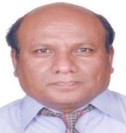
ABSTRACT
Sri Aurobindo's philosophy, poetry, translations, and commentaries on the Vedas, Upanishads, and the Gita can be classified into three interrelated dimensions: The Life Divine, representing the theoretical aspect of Integral Yoga; Synthesis of Yoga, representing the practical aspect; and Savitri, representing the aesthetic aspect. This classification can be compared to the three classifications made by Kant into Science, Morals, and Art, or to that of Aristotle between Theoretical, Practical, and Productive Sciences.
In this broader context, I will discuss Sri Aurobindo's position on Indian culture, both retrospectively and prospectively. Retrospectively, I will address Sri Aurobindo's response to the charges leveled by William Archer, who claimed that 'India must be proved altogether barbarous in order to destroy or damage her case for self-government.' There is a claim that there is no science, technology, grammar, doctrines of morality, or ethical theories in Hinduism.
Looking forward, I will expand on Sri Aurobindo's response to issues concerning Neo-Hinduism and Neo-Vedanta brought out by Paul Hacker and Wilhelm Halbfass.
Keywords: Science, Technology, Buddhism, Vedanta, Vaishnavism, Shaivism
Director: Dr. Raj Kumar
Moderator: Dr. Shipra Dikshit
President: Professor Bal Ram Singh
Kuruom School of Advanced Sciences, Lucknow, India & Institute of Advanced Sciences (INADS), Dartmouth, MA, USA
Meeting link: https://us02web.zoom.us/j/6977021728?pwd=NlZWQ1p5d3BXQTdKWDhHUC95L3UxZz09&omn=85788810550
Date: (16-08-2024), TIME: 6 PM (IST) / 7:30 AM (EST)
Philosophy Cafe - Season 2 - 2nd Edition – ID: 697 702 1728, Passcode:
130612
Live on: YouTube : @KSASTALK
SPEAKER’S PROFILE
Professor Meera Chakravorty is a former member of the Karnataka State Women's Commission. Currently, she is a member of the research faculty at Jain University in New Delhi. She is the author and editor of "Dynamics of Dissent" and actively participates in various women's movements.
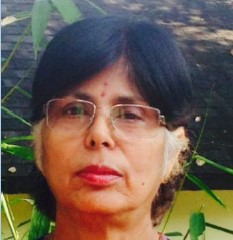
ABSTRACT
Philosophy Cafe presents the Lecture Series on "Hundred Years of Development in Indian Philosophy (1924-2024)." We are pleased to have Professor Meera Chakravorty from Jain University in New Delhi, India, as our presenter.
Kuruom School of Advanced Sciences, Lucknow, India & Institute of Advanced Sciences (INADS), Dartmouth, MA, USA
Meeting link: https://us02web.zoom.us/j/89876501010?pwd=BRftxnTMV6Rt2PSYV0aXY9A9kt9rIp.1
Date: (16-07-2024), TIME: 6:30 pm (IST)
Philosophy Cafe - Season 2 - 1st Edition – ID: 898 7650 1010, Passcode:
325180
Live on: YouTube : @KSASTALK
SPEAKER’S PROFILE
Professor Rakesh Chandra was a member of the Indian Council of Philosophical Research and also served as the Dean of Students Welfare. Previously, he held the position of Head of the Department of Philosophy and Director at the Institute of Women's Studies at Lucknow University. With over 25 years of teaching experience, he has been a consultant with UNICEF on primary education and child labor. Additionally, Professor Chandra has been the recipient of UGC and ICPR scholarships and has served as co-investigator of a UGC Major Research Project.
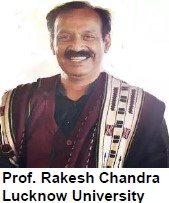
ABSTRACT
The Kuruom School of Advanced Sciences (KSAS), an Indian Subsidiary of the Institute of Advanced Sciences USA is pleased to announce season two of the Philosophy Cafe series. This is a very interesting season where we are going to invite some eminent philosophers who will discuss contemporary Indian philosophers and their philosophical reflections. The theme of this season is Hundred Years of Development in Indian Philosophy(1924-2024). The first speaker for Philosophy Cafe - Season 2 is Professor Rakesh Chandra, who was a member of the Indian Council of Philosophical Research, Dean of Students Welfare, and the Former Head of the Department of Philosophy and Director of the Institute of Women’s Studies, Lucknow University. He will discuss "SOME REFLECTIONS ON RADHAKRISHNAN'S FRAGMENTS OF CONFESSION."
Kuruom School of Advanced Sciences, Lucknow, India & Institute of Advanced Sciences (INADS), Dartmouth, MA, USA
Meeting link: https://us02web.zoom.us/j/85312869005?pwd=AFVhUIrIf8vOh505QrAFHw7AogQPf8.1
Date: (16-06-2024), TIME: 6:30 pm (IST)
Philosophy Cafe - 8th Edition – ID: N/A, Passcode:
N/A
Live on: YouTube : @KSASTALK
SPEAKER’S PROFILE
Dr. Zairu Nisha, PhD is an Assistant Professor in the Department of Philosophy at Ramanujan College, University of Delhi. Her area of specialization and research consists of Bioethics, Continental Philosophy, Ethics, Feminism, Indian Philosophy, and Philosophy of Technology. She has presented her work at various conferences and has published articles in these areas.
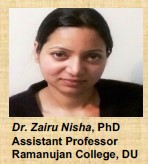
ABSTRACT
Birthing is a natural phenomenon. However, in the era of modernization, it has dramatically changed and transformed into a technical affair. Feminists claim that advances in medicine and reproductive technologies (ARTs) have opened up numerous opportunities and choices for women to free the procreative body from their destined role of maternity by separating sex from reproduction. But, are these technological artifacts always there to emancipate women or just another way to keep them subordinated to serve social needs? Another cohort of feminists argues that technology is a controlling tool. It eliminates a woman's choice and uses her body as a baby manufacturing machine to perpetuate pervasive social roles and responsibilities. Again, if technology is simply a patriarchal trap, then can technological exclusion be the key to all reporductive issues? It seems not! Technology is the inevitable new reality of the world influenced by socio-cultural practices, values, norms and belief systems that strongly impact human existence. The present paper attempts to critically explore and evaluate the ethical challenges posed by the technization of the maternal body from two opposite feminist perspectives. I argue that these ARTs-centered debates are significant but polarised and insufficient to resolve the problem of the body. Thus, we need an egalitarian model of technology that saves women from the threat of technization and be able to provide a dignified use of it. The paper discusses the impact of technization on the maternal self and body in relation to ARTs and proposes suggestions to overcome this problem.
Kuruom School of Advanced Sciences, Lucknow, India & Institute of Advanced Sciences (INADS), Dartmouth, MA, USA
Meeting link: https://us02web.zoom.us/j/6977021728?pwd=NlZWQ1p5d3BXQTdKWDhHUC95L3UxZz09&omn=81263483113
Date: (16-05-2024), TIME: 6 PM (IST) / 7:30 AM (EST)
Philosophy Cafe - 7th Edition – ID: 697 7021 728, Passcode:
130612
Live on: YouTube : @KSASTALK
SPEAKER’S PROFILE
1st Talk
Professor Bhagat Oinam, M.Phil, Ph.D Chairperson at the Centre for Philosophy, SSS Chairperson at the Special Centre for the Study of North East India, JNU
2nd Talk
Dr. Rajiba Lochan Behera is an Assistant Professor at the Department of Philosophy & Religion Faculty of Arts, BHU
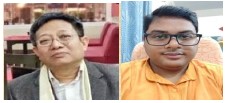
ABSTRACT
1st Talk
Consciousness has been a subject matter of discussion across intellectual traditions. While some traditions see it as metaphysically significant, some others emphasise on the metaphysical untenability of the concept. Yet some other traditions emphasise on delineating the nature of the concept as an epistemological tool.
The proposed presentation shall attempt to focus on the philosophical reading of the concept as an approach/tool towards identity formation, and building of narratives through deeper dwelling of the selves in the lifeworld of a community/collective. While a theoretical framework will be drawn through phenomenological reading of consciousness. Rather, an attempt will be made to engage with specific philosophical and cultural traditions in India, where self-awareness and intuitive comprehending of the world from the content of the intellectual discourses. The presentation will be made from the prism of a cross-cultural perspective.
2nd Talk
The aim of this paper is to shed light on how ordinary language users adopt and manage their problems of semantics in the realm of technolingualism and metrolingualism. In XXI century, we are, most of us, technolinguals. Language and technology have advanced in analogous. In technolingualism, there is a commonly convincing connection between language and technology. But, in metrolingualism, language and people of different backgrounds are linguistically intensely involved in an everlasting exchange. According to Heidegger, "language is the house of being" which means we reside in the language and those who think and those who create with words are the guardians of this home. But the present situation is that "technology is the house of language" and "language is the house of being" is parallel. It seems paradoxical in the realm of technolingualism. Because, technology does not bear the essence of a being, life of a being and world-being relationship. While Quine argues that "language is a social art" which means a word that someone uses when they see some object. Words are meaningful to us when we can use them, the ways that other people use them. This use does not mean that the world means the object, it is just a word that person uses when that object is seen. It is a big challenge to deal multilingual and multicultural situations in the realm of metrolingualism due to the high frequency of the migration of people, change of language and culture. Migration of people breeds change of language and culture is based on technolingualism. Technolingualism reproduces semantics depending on translation but Quine's criterion of indeterminacy of translation causes the impossibility of semantic appropriateness. Moreover, from the Fregean perspective of technoutopianism, it avoids semantics problems through context principle. But context principle is not a solution for the problem of semantic inappropriateness. Consequently, from the semantic point of view of Quine and Heidegger, the author tries to relook the boundary of semantics for the ordinary language users whether they are able to attend appropriate semantics of language in the realm of metrolingualism and technolingualism or not.
Kuruom School of Advanced Sciences, Lucknow, India & Institute of Advanced Sciences (INADS), Dartmouth, MA, USA
Meeting link: https://us02web.zoom.us/j/6977021728?pwd=NlZWQ1p5d3BXQTdKWDhHUC95L3UxZz09&omn=89820075061
Date: (16-04-2024), TIME: 7:30 PM (IST)
Philosophy Cafe - 6th Edition – ID: 697 7021 728, Passcode:
130612
Live on: YouTube : @KSASTALK
SPEAKER’S PROFILE
Dr. Alok Tandon is an independent researcher, known for his rational and inquisitive spirit as well as for his passion and contribution in Ethics, Philosophy of Religion, and Social Philosophy. He was honored by Akhil Bhartiya Darshan Parishad with the "Nagar Award" for his contribution to the field of Philosophy.
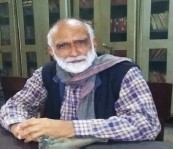
ABSTRACT
At the end of "Being and Nothingness,' Sartre faced some unresolved contradictions. He could not give a valid criterion to judge authentic from inauthentic acts. Thus, Sartre faced the dilemma of how to preserve his radical conception of freedom and account for his support for any type of public policy. To accommodate his concept of absolute freedom with the fact of social unfreedom, Sartre, in his "Critique of Dialectical Reason," focused on human beings, not as an isolated individual, but as members of a group with a similar approach to the world. By reassessment of Marxism, he tried to develop a new method of historical analysis and suggested vigorous reconstruction of Marxism. He introduced some new concepts like praxis, scarcity, the ractico-inert, and the revised concept of freedom. Combining these, a new social philosophy comes out, which can be termed as "Existential Marxism of Sartre."
Kuruom School of Advanced Sciences, Lucknow, India & Institute of Advanced Sciences (INADS), Dartmouth, MA, USA
Meeting link: https://us02web.zoom.us/j/6977021728? pwd=NlZWQ1p5d3BXQTdKWDhHUC95L3UxZz09&omn=823620 50098
Date: (28-03-2024), TIME: 6 PM (IST)
Zoom Link – ID: 899 1824 4013, Passcode:
426258
Live on: Youtube: @KSASTALK
SPEAKER’S PROFILE
Dr Varun Sharma is currently employed as an assistant Professor in Government College for Women Udhampur in the Union Territory of Jammu and Kashmir. He is PhD from Jawaharlal Nehru University and His area of interest is Existential Philosophy.
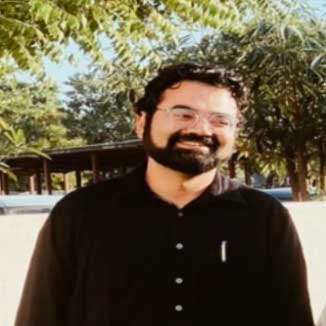
ABSTRACT
The advent of smartphones has ushered in a profound shift in human experience, redefining notions of communication, knowledge, and identity. Philosophically, this phenomenon prompts reflection on the nature of reality, as the boundary between the physical and digital worlds blurs. Questions arise regarding the authenticity of virtual interactions and the impact of constant connectivity on personal autonomy and self-awareness. Moreover, the abundance of information at our fingertips challenges traditional epistemological frameworks, raising concerns about the validity and reliability of knowledge in the digital age. Ethical considerations emerge concerning privacy, surveillance, and the commodification of personal data, prompting re-evaluation of societal values and norms. In this regard, my presentation attempts a philosophical inquiry into the nature of human existence, consciousness, and the evolving relationship between individuals, technology, and the broader social fabric.
Kuruom School of Advanced Sciences, Lucknow, India & Institute of Advanced Sciences (INADS), Dartmouth, MA, USA
Meeting link: https://us02web.zoom.us/j/87422475257?pwd=amIIZ01UN1FBRkJjQ00vNIUrbkVBUT09
Date: (16-03-2024), TIME: 6 PM (IST) / 7:30 AM (EST)
Philosophy Cafe - 5th Edition – ID: 874 2247 5257, Passcode:
129387
Live on: YouTube : @KSASTALK
SPEAKER’S PROFILE
Professor Asha Mukherjee - Former Dean at the Institute of Humanities and Social Sciences, Vishva-Bharati, Santiniketan
Professor Rakesh Chandra - Former Director at the Institute of Women Studies, Lucknow University
Professor Shivani Sharma - Former Chairperson in the Department of Philosophy at Punjab University
Professor Bal Ram Singh - President of the Institute of Advanced Sciences (INADS), USA
Professor Meera Chakraborty - Former Member of the Karnataka State Women's Commission
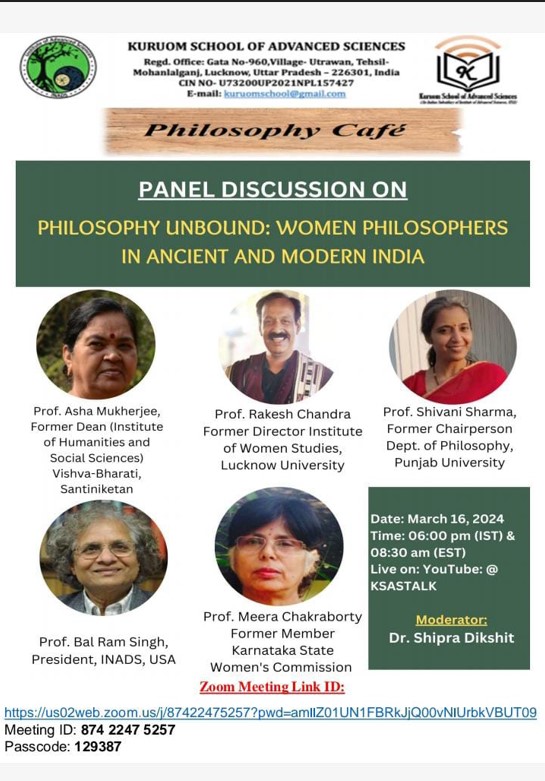
ABSTRACT
Panel discussion on "Philosophy Unbound: Women Philosophers in Ancient and Modern India."
Kuruom School of Advanced Sciences, Lucknow, India & Institute of Advanced Sciences (INADS), Dartmouth, MA, USA
Meeting link: https://us02web.zoom.us/j/85353868562?pwd=enQxa2QrRlBEcEhqRTVRZ2pWdVlEUT09
Date: (16-02-2024), TIME: 6 PM (IST) / 7:30 AM (EST)
Philosophy Cafe - 4th Edition – ID: 853 5386 8562, Passcode:
576551
Live on: YouTube : @KSASTALK
SPEAKER’S PROFILE
Dr. Varun Sharma is an Assistant Professor at Government College for Women Udhampur in the Union Territory of Jammu and Kashmir. He earned his Ph.D from Jawaharlal Nehru University. His area of interest is Existential Philosophy.
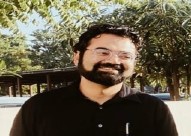
ABSTRACT
I attempt to make the case that Kierkegaard and Nietzsche, more than any other philosophers, constructed their philosophy out of the very rubrics of their own lives. Their philosophy was characterized by self-reference not in content alone, but in structure too. They wanted to set philosophy aside from all systemic presuppositions and concentrate on the problem of the individual's existence in this world. This they sought to achieve by analyzing the lives of the closest known individuals to them: themselves. Thus, a rewarding way of characterizing their philosophies is looking at them as a kind of back-and-forth between the person and the philosopher.
Kuruom School of Advanced Sciences, Lucknow, India & Institute of Advanced Sciences (INADS), Dartmouth, MA, USA
Meeting link: https://us02web.zoom.us/j/87409035050?pwd=N29UQ0RlRDcwNXYxRStMd0xBV0F1QT09
Date: (16-01-2024), TIME: 6 PM (IST) / 7:30 AM (EST)
Philosophy Cafe - 3rd Edition – ID: 8740 903 5050, Passcode:
687416
Live on: YouTube : @KSASTALK
SPEAKER’S PROFILE
Dr. Ramesh Chander is an Assistant Professor of Philosophy at Government College for Women, Parade Ground, Jammu since December 2016. His area of specialization and interests include Existentialism, Phenomenology, and Ethics. He earned his M.Phil and Ph.D. in 2011 and 2017 respectively from Jawaharlal Nehru University, New Delhi.
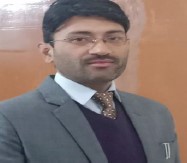
ABSTRACT
In this lecture, an attempt is made to analyze Merleau-Ponty and Levina's notions of reciprocity. Merleau-Ponty grounds his notion of reciprocity on his thesis of reversibility which in turn reflects symmetrical reciprocity and substituability of self for the Other. Levinas, on the other hand, grounds his notion of reciprocity on his thesis of irreversibility which in turn reflects non-symmetrical reciprocity and non-substitutability of one for the other. The former believes that the symmetrical notion of reciprocity acts as mutual recognition and justice towards the Other while the latter holds that the asymmetrical notion of reciprocity provides true recognition and justice towards the Other. Levinas and some feminist thinkers - Sally Fischer, Shannon Sullivan, and Judith Butler - see Merleau-Ponty's Symmetrical notion of reciprocity as nothing but violating Other's particularity by assimilation of differences and thus cannot be the guiding principle of intersubjective life. My main objective in this lecture is to see how far their charges are labeled against Merleau-Ponty's Symmetrical notion of reciprocity holds true.
Kuruom School of Advanced Sciences, Lucknow, India & Institute of Advanced Sciences (INADS), Dartmouth, MA, USA
Meeting link: Meeting link
Date: (27-12-2023), TIME: 5 pm (IST)
Zoom Link – ID: 8316 920 0811, Passcode:
807573
Live on: Youtube: @KSASTALK
SPEAKER’S PROFILE
Brajesh Kumar
Brajesh Kumar Mishra (IPS) serves as the Superintendent of Police at the Police Training School in Sultanpur, Uttar Pradesh. In addition to his dedicated service in law enforcement, he is a multifaceted individual with a passion for inspiring others. Brajesh Kumar Mishra is not only an accomplished law enforcement professional but also a renowned motivational speaker, prolific writer, and spiritual thinker. Brajesh Kumar Mishra is recognized for his motivational speaking engagements. He could inspire and uplift others, sharing insights from his experiences in both the police force and life in general. His motivational talks are aimed at empowering individuals to overcome challenges and reach their full potential.
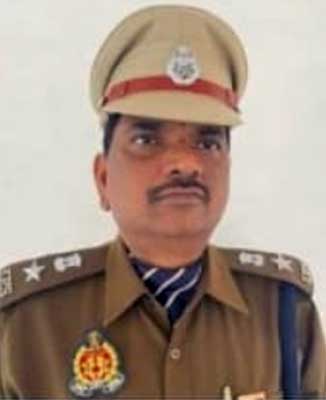
ABSTRACT
मुग़लों के आक्रमण के समय मध्यकालीन भारत में जब आध्यात्मिक और सामाजिक चेतना सुप्त पड़ी थी तब अनेकानेक मत मतांतरों में उलझे भारतीय समाज को श्रीरामचरित मानस के माध्यम से गोस्वामी तुलसीदास ने पुनर्स्थापित करने का प्रयास किया। लोक की भाषा और सनातन मूल्यों से आप्लावित यह महाकाव्य भारतीय चेतना का मार्गदर्शक है। वैष्णव और शैव संप्रदायों के मध्य समन्वय, पारिवारिक मूल्यों के मध्य समन्वय, आपसी संबन्धों के मध्य समन्वय, कर्म और भाग्य का समन्वय, निर्गुण और सगुण भक्ति के मध्य समन्वय इत्यादि अनेकों पक्ष इस महाकाव्य की अनुपम पूंजी रही है। कर्म सिद्धान्त, मानवतावाद और पारिवारिक मूल्यों की प्रतिष्ठा रामचरित मानस की प्रमुख विशेषताओं में रही है। इन समस्त मूल्यों के मूल में लोक जागरण की चेतना को स्थापित करना लक्षित विषय रहा है जिसको समन्वयवादी दृष्टि से तुलसीदास जी ने जागृत करने का प्रयास किया है।
Kuruom School of Advanced Sciences, Lucknow, India & Institute of Advanced Sciences (INADS), Dartmouth, MA, USA
Meeting link: https://us02web.zoom.us/j/89413767358?pwd=NVFvbndKcG5GaGY0WHM2M3hhSHBPQT09
Date: (16-12-2023), TIME: 5 PM (IST) / 6:30 AM (EST)
Philosophy Cafe - 2nd Edition – ID: 894 1376 7358, Passcode:
417354
Live on: YouTube : @KSASTALK
SPEAKER’S PROFILE
Dr. Manoj Kumar Panda has been an Assistant Professor of Philosophy at Presidency University, Kolkata since 2015. His research interests span the Philosophy of Mind, Epistemology, Philosophy of Perception, and Consciousness. His research works in the above fields draw insights from both Analytic and Phenomenological traditions. He earned his PhD from Jawaharlal Nehru University.
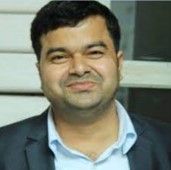
ABSTRACT
My aim in this lecture is to understand the nature of one of the important aspects of consciousness i.e. phenomenal consciousness or we can call it the qualitative and subjective aspects of consciousness. To begin with, one can say that it is the irreducibility of phenomenal consciousness to physical truths which at the heart of all the debates and issues surrounding consciousness. Consciousness is something that makes the relationship between mind and body a difficult philosophical problem to solve because it is such a characteristic or property of the mind without which minds would not be seen as radically opposed to the body the way it is seen by many philosophers. This points to the epistemic and ontological gap between the phenomenal and physical domain pertaining consciousness. The question that has been asked in this context is: Can the knowledge of our phenomenal mind and phenomenal experience be reduced to the knowledge of physical truths about mind and experience? While pursuing this question, I will discuss Frank Jackson's knowledge argument against physicalism in light of some of the criticisms raised by Paul M. Churchland and Michael Tye.
Kuruom School of Advanced Sciences, Lucknow, India & Institute of Advanced Sciences (INADS), Dartmouth, MA, USA
Date: (16-11-2023), TIME: 5 PM (IST)
Philosophy Cafe - 1st Edition – ID: 851 5986 5960, Passcode:
021721
Live on: YouTube : @KSASTALK
SPEAKER’S PROFILE
Dr. Rahul Kumar Maurya obtained his M. Phil and PhD from JNU in 2011 and 2016 respectively. He is currently an Assistant Professor at BHU. His areas of specialization include Philosophy of Language, Epistemology, Metaphysics, and Contemporary Pragmatism. He also has interests in Logic, Critical Thinking, Social and Political Philosophy and Ethics.

ABSTRACT
First, we need to understand the concept of the world and what it involves. Philosophers have often used the concept of the world in a narrower sense meaning body or matter but the concept of the world used here is quite wider and comprehensive, in a sense, it involves physical reality, social reality, mental reality, and moral reality. To understand the world from a pragmatic perspective, it would be evocatively monumental to reflect on how traditional philosophy has understood the world as mentioned above and what difficulties it has within.
Traditional philosophy tends to be philosophy in a speculative framework, all its rigor has been directed to find historical and priori reasons for the foundation of knowledge and the constitutive underlying principles of reality. It tends to provide a totalizing thought about everything once and for all leaving no scope for change or alteration in thought. Such a universal and absolutist tendency in philosophizing has pushed away all the human contingencies, differences, limitedness, and the idea that we have gradually evolved in history. Once such a philosophical system has come in place, it has subsequently made human reason almost redundant and become hegemonic and opressive against any divergent thought. It is here that a pragmatic lens to understand the world can offer a panacea to many of the problems accrued in traditional philosophical thinking and an edge to deal with everyday problems in our lives.
